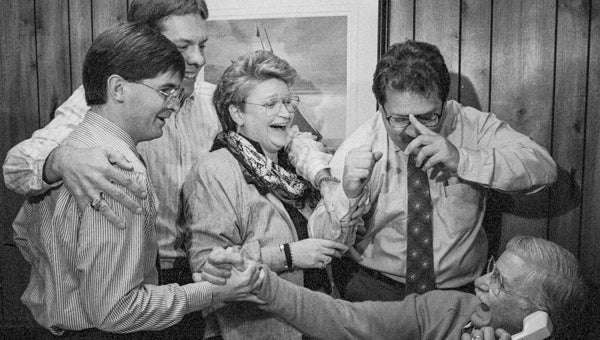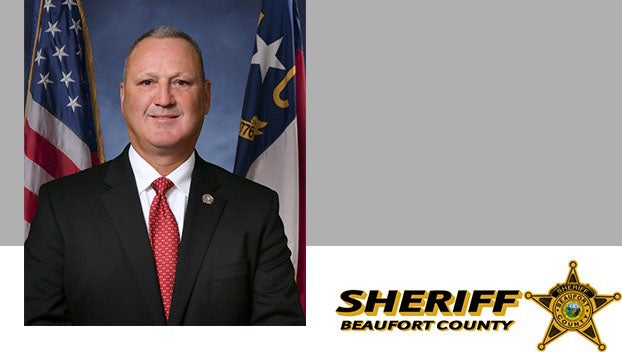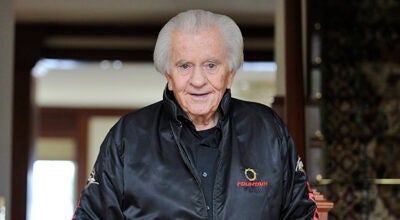Looking back on the Daily News’ Pulitzer Prize
Published 11:18 pm Saturday, April 18, 2015

RIC CARTER
THE HIGHEST HONOR: (From left to right) News Editor Mike Adams, Brownie Futrell, Betty Mitchell Gray, Mike Voss and Bill Coughlin are pictured at the very moment Coughlin was told the Washington Daily News had won the Pulitzer Prize gold medal for Meritorious Public Service on April 12, 1990.
It was not a normal day. On April 12, 1990, there was a buzz in the air, a limbo threaded with undercurrents of excitement. Family, friends, TV reporters and their cameras overflowed the small Market Street office of the Washington Daily News. All of them awaited the announcement — had the Daily News won the Pulitzer Prize for Meritorious Public Service?
“We knew we were finalists and we thought we had a pretty good chance because we had won some other major awards,” said Mike Voss, one of the reporters who worked on the series in the running for the Pulitzer gold. “But you never know, because we were going up against the big boys like the New York Times, the Washington Post. What made me think that we had a chance was the News & Observer sent their photographer to shoot color — that wasn’t a big thing then. But the editor of the New & Observer was on the Pulitzer board. I put two and two together.”
Shortly after 3 p.m., the paper’s editor, Bill Coughlin, was on the phone with the Associated Press in Raleigh, awaiting the announcement that would come from the New York AP office to the Raleigh office.
“All of a sudden, Bill shoots his fist up in the air and says, ‘Daily News, Public Service,’” said Brownie Futrell, former publisher of the Daily News. “Then we all just grabbed each other.”
The Pulitzer was not the first major award the Daily News’ series had won: the first was the Public Service Award from the North Carolina Press Association. Four more would be accrued — the University of Missouri’s top award for investigative journalism, the national journalism fraternity Sigma Delta Chi’s highest award, the Associated Press Managing Editor’s Public Service Award, topped off by the Pulitzer gold medal on that spring day in 1990.
Celebration was in order.
“When we found out we had won, we toasted with Dom Perignon, but we were spraying each other with the $3 bottles,” Voss laughed.
It was an exciting time to be a part of the Washington Daily News staff, but it was also a trying time, where friendships were stretched thin and public officials were convinced the Daily News was hurting, not helping, the City of Washington. The series that earned the Daily News the Pulitzer was one that unveiled a contamination of the city’s water supply. That the city’s water supply was contaminated with carcinogens was not a deep, dark secret, according to those who worked on the series. On the contrary, it was very much known by city officials — it had been contaminated for eight years. But city officials chose not to disclose it to the public. They also chose not to fix it.
And people were beginning to get worried, according to Betty Mitchell Gray, who also wrote part of the series.
“Honest to God, how it started was I got a call, an anonymous call, from somebody who did not identify himself, saying something’s wrong with the city water supply,” Gray said. “I said, ‘OK, I’ll check on it at some point.’ A week went by, and I got another call — something’s wrong with the city water supply. Then I got a third call and I said, ‘I’m checking this out today.’”
Written on the city’s water bill, as pointed out by Daily News Editor Bill Coughlin, the fine print stated that water supply test results were available by request. The Daily News made a request, then sent those results off to get an expert opinion on what they said.
“The thing that people need to remember is the city never tried to hide the results,” Gray said. “Where they differed with the state people was what those results meant.”
Only a day after the Washington city manager at the time, Bruce Radford, drank a glass of City of Washington water during a TV interview, proclaiming it safe to all the eastern North Carolina viewers, state Health Director Ron Levine shut down the city’s water supply — the level of carcinogens was too high for drinking.
“It was a heck of a time,” Gray said. “We were not real popular with the Chamber of Commerce while this was going on.”
The series caused problems on several fronts: down went the water supply, in came Marine Corps tankers filled with water to supply city residents. Washington was getting a black eye in the media, which is never good for economic development.
Publisher and owner of the paper Ashley Futrell Sr. was friends with then-mayor Stancil Lilley. His son, Brownie Futrell, was contemporaries with the city manager.
“Several times, during the course of the series, Lilley would be in his office working on him and Bruce Radford would be in my office working on me,” Brownie Futrell said. “We were under a lot of pressure from a lot of people in the community to stop it or modify the coverage.”
The pressure didn’t work, according to Gray.
“At no time did Ashley Futrell or Brownie Futrell, at no time did either one of them come in and say, ‘You’re causing problems for our friends — cut it out.’ They were more than willing to let us go and find the truth and let the chips fall where they may,” Gray said. “Brownie and his dad often don’t get enough credit for that. They let us do what we needed to do to get to the bottom of it.”
“I’ve told people that we would not have won the Pulitzer if my father had not already established that culture — (that) our only currency is our credibility,” Futrell said.
That currency would lead to major awards for the small-town daily. But it would also lead to something much bigger, and much more important to people living in small towns across the nation.
“I think we won the gold medal not so much because of good investigative journalism, because it was, but because of what the results produced,” Voss said.
In 1989, municipalities of less than 10,000 residents were required to test their water supplies just like any larger town. But those approximately 40,000 municipalities across the U.S. did not have to comply by state or federal standards regarding the presence of high levels of carcinogens in water supplies. They weren’t required to tell the public about the potentially cancer-causing agents, nor were they required to fix the problems causing the contamination. But the Daily News series had made headlines and suddenly government was not only paying attention, but acting.
“It changed both state and federal law. … The state health director acted first, but then the EPA changed its federal regulations,” Futrell said. “What it said was that our health was just as important as the health of those in bigger cities.”
“Those who were basically not protected before, became protected,” Voss said.
The Pulitzer award, however, didn’t smooth things over with the city, likely because the series was published during the lead up to Washington’s municipal election. The mayor and two city councilmen lost their seats that November — had more than two non-incumbent candidates run for office, the other three would have lost theirs, as well, according to Futrell. One city council member wrote to the Pulitzer committee asking them to rescind the award and the three councilmen who remained after the election voted not to recognize the newspaper for its Pulitzer.
“When that happened, the Chamber of Commerce stepped in and said they wanted to honor the newspaper,” Futrell said.
“It was an interesting time,” Voss said. “It was kind of tough covering the city because the relationship was kind of strained. … But conversely, we’d be going down the street and people would stop us and thank us for doing what we did.”
Twenty-five years ago, change was put in motion, starting with a phone call, ending in a series of stories that would impact every person living in a small town in America. The City of Washington found a way to fix its water supply, the bar for state and federal drinking water standards was raised, and The Washington Daily News became the smallest daily newspaper to ever win the Pulitzer gold medal for Meritorious Public Service.





